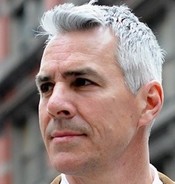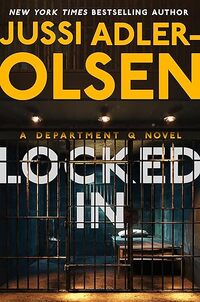This week's Jen's Jewels features a brilliantly unconventional story about an obituary writer who accidentally publishes his own obituary. Can you imagine the mortification (pun intended)? While death isn't everyone's favorite conversation topic, John Kenney tackles it with the perfect blend of humor and poignant reality, creating a read you won't want to miss. If you're searching for something refreshingly different to add to your reading list, this gem is absolutely for you!
Jennifer Vido: What sparked the idea for this novel? Was there a particular moment or experience that led you to explore the life of an obituary writer?
John Kenney: There was. It was the last time I saw my brother, Tom. He was in the final stages of cancer, but home, well cared for. My four other brothers and I planned a final visit. I arrived first. Tom was in a lounge chair, too thin now but smiling. We talked for a bit when I heard a car pull into the driveway and looked out the window. “The others are here,” I said to Tom. With Buster Keaton timing, stone-faced, Tom dropped an arm over the side of the chair, let his head fall to one side, and, trying to suppress a grin, said, “Tell them they’re too late.” I wanted to capture that in a book. Not the story, but the tone, the essence of finding humor in life and in death.
Jen: The concept of someone accidentally publishing their own obituary is both hilarious and thought-provoking. What drew you to this premise, and how did you approach turning it into a full-length story?
John: I’ve always read obituaries. I find them fascinating. They move me, give me a bit of a chill. I’m also not someone who can stay in intense moments for long and have to laugh or make a joke. I think the technical term for that is “teenager.” I knew Bud (the hero) would be an obituary writer. The idea of drunkenly writing his own obituary came to me one day on an afternoon walk. I found it absurd and cringe-worthy and I love those feelings. Mostly it was the idea of an obit writer who didn’t understand life that intrigued me.
Jen: Bud starts attending wakes and funerals to learn how to live. What do you think real-life funerals reveal about the way people approach life and legacy?
John: I can only speak for myself. But I think ceremony matters. So much of life is rote. The forgettable morning shower, the cold sandwich at lunch from Pret. The drive home that you were spacing out on the whole way. Wakes, funerals…they force us to pay attention in such a profound way. I was at a wake six weeks ago as I write this. Another brother. Amazing guy. Hundreds of people waited for hours to pay respects. The intensity of those few hours, greeting these old friends, the sobering reality that this will be us one day. I think it can’t help but inform how we live. We leave that funeral home, so happy to be alive, to go home, see our family. Death is pretty great teacher. Virginia Wolff said, “Someone has to die in order that the rest of us should value life more.” I wish that wasn’t true but it is.
Jen: Your novel blends humor and deep emotional themes beautifully. How do you strike the right balance between comedy and poignancy in your writing?
John: I wish I had an answer that made me sound deeply intelligent and methodical. I’m neither. I tend to focus on small parts of the canvas. A scene, the dialogue. What am I trying to say? How can I do with a bit of surprise? I like small moments. I like wounded people. I like the courage people show in the face of pain. I like absurdity. Of course I want people to feel deeply when reading. But I also want them to laugh. I feel I owe them that. The world is a heavy place.
Jen: The dynamic between Bud and his best friend, Tim, adds depth to the story. What role does friendship play in Bud’s journey, and how did you develop their relationship?
John: Bud is like a lot of men I know. A bit of a loner. He has acquaintances, but few close friends. That makes for a long day. Again, I wish I had an intelligent answer for you about how I developed their relationship. But mostly it was the characters themselves. As they reveal themselves to you, the more you write. The more you add nuance and backstory. As they became these broken men, one physically and one emotionally. Their connection. There’s that feeling when you meet someone who you just know is going to be a friend. And the difference it makes in your life.
Jen: What is your writing routine like? Do you have any habits or rituals that help you get into the creative flow?
John: I don’t have much of a routine. When I’m in a project I think of it constantly. I’ll try to write in the morning. And if that’s not working at least make notes, sketch out scenes, ideas. I’ll give it another go in the afternoon. I tend to write in bursts, not slowly and methodically. Then I’ll go back over the work. One thing I do most every afternoon is walk. It’s amazing to me how many ideas I have while walking. My brain is very happy outside. I like to print pages out, hold them, make them up. I see things a bit differently when I’m holding actual pages.
Jen: Your books often explore themes of middle age, second chances, and reinvention. What draws you to these topics, and how do they resonate with you personally?
John: Well, I’m middle-aged and often in need of another chance. I was a late bloomer. (That is assuming I’ve bloomed at all.) I’m fascinated about our obsession with the past. Or is that just me? We look back so much. We’re so often unkind to ourselves about our past. Wishing we’d done this or not done that. And yet we don’t give ourselves credit for seeing that now, having moved on, gotten to a better place. Despite my naturally depressive state, I tend to be hopeful in an almost child-like way.
Jen: What’s next for you? Are you working on another novel, or do you have any upcoming projects you can share?
John: I’m working on a new book but don’t love talking about it. Takes the magic away once I say it.
Jen: What’s currently on your TBR stack? Are there any books you’ve recently read and loved?
John: I just got a superb book called Whale Eyes by James Robinson. It’s really beautiful. Also just read Matthew Klam’s novel Who Is Rich. Just a fantastic writer. Draws such nuanced characters. And is laugh-out-loud funny.
Jen: What’s something interesting about you that readers might not know? A surprising hobby, an unusual job from your past, or something that influences your writing in unexpected ways?
John: I won a Nobel Prize for Physics three times. That’s a lie. I think the thing that influences my writing most is my children. I started late and have two teenagers. They blow me away. They unearthed parts of me I never knew existed. Patient. Empathetic. Open to wonder. Eager to laugh. Eager to feel. Other than that, I’m a wildly uninteresting person. No real hobbies, although I have gotten into bird watching since we moved out of the city. See? I told you I was dull.
Jen: Thank you for taking the time to chat with us! Where can readers follow you to stay updated on your latest work?
John: My Instagram Page. Thank you for the chance to chat.

An Indie Next & LibraryReads Pick for April
The Office meets Six Feet Under meets About a Boy in this coming-of-middle-age tale about having a second chance to write your life’s story.
Bud Stanley is an obituary writer who is afraid to live. Yes, his wife recently left him for a “far more interesting” man. Yes, he goes on a particularly awful blind date with a woman who brings her ex. And yes, he has too many glasses of Scotch one night and proceeds to pen and publish his own obituary. The newspaper wants to fire him. But now the company’s system has him listed as dead. And the company can’t fire a dead person. The ensuing fallout forces him to realize that life may be actually worth living.
As Bud awaits his fate at work, his life hangs in the balance. Given another shot by his boss and encouraged by his best friend, Tim, a worldly and wise former art dealer, Bud starts to attend the wakes and funerals of strangers to learn how to live.
Thurber Prize-winner and New York Times bestselling author John Kenney tells a funny, touching story about life and death, about the search for meaning, about finding and never letting go of the preciousness of life.
Fiction [Zibby Books, On Sale: April 1, 2025, e-Book , / eISBN: 9798989923014]

John Kenney is the author of Truth in Advertising, which won the Thurber Prize for American Humor in 2014. He has worked as a copywriter in New York City for seventeen years. He has also been a contributor to The New Yorker magazine since 1999. Some of his work appears in a collection of The New Yorker’s humor writing, Disquiet, Please! He lives in Brooklyn, New York.
INSTAGRAM

Jennifer Vido writes sweet romances set in the Lowcountry, earning acclaim as the award-winning author of the Gull Island series. Her debut novel, "Serendipity by the Sea," secured the prestigious Best First Book award from the New Jersey Romance Writers Golden Leaf Contest. In 2024, Vido's talent garnered further accolades, with Baltimore Magazine readers naming her Best Local Author in their annual Best of Baltimore poll, while the Baltimore Sun acknowledged her with an Honorable Mention in their Best of 2024 Author category. When not writing fiction, she interviews authors for her weekly Jen’s Jewels column, leads water exercise classes, and directs a legal nonprofit. Currently residing in Maryland, she and her husband are proud parents to two grown sons and a rescue dog named Fripp.
No comments posted.


 © 2003-2025 off-the-edge.net
all rights reserved Privacy Policy
© 2003-2025 off-the-edge.net
all rights reserved Privacy Policy